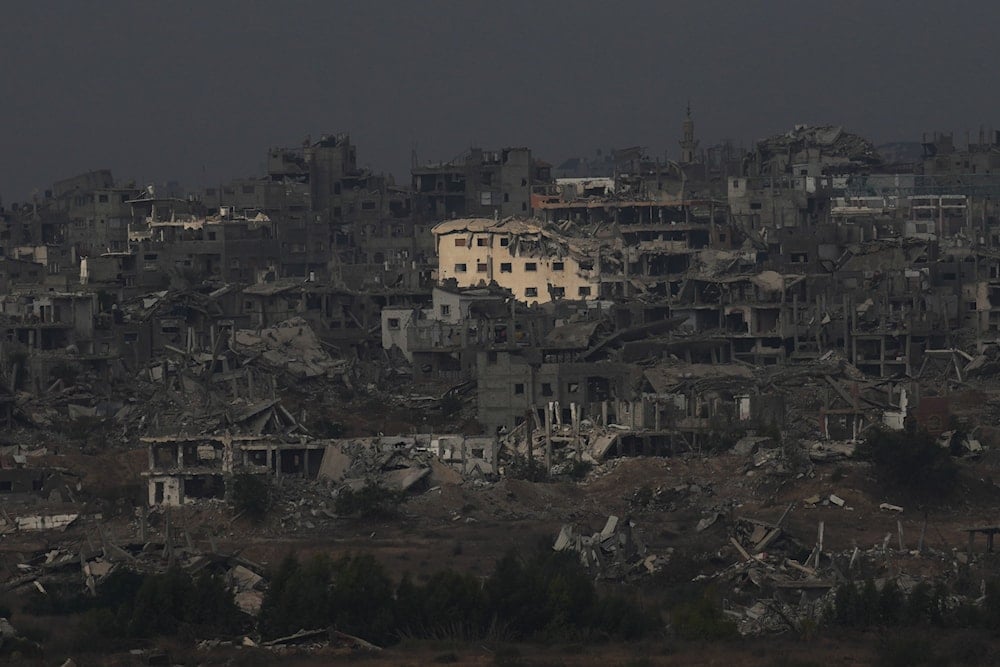Complaint targets EU bank’s complicity in Israeli war crimes in Gaza
The Hind Rajab Foundation files a complaint accusing the EIB of complicity in war crimes through funding blacklisted Israeli institutions.
-

Buildings destroyed during Israeli ground and air operations stand in the Gaza Strip, as seen from the occupied Palestinian territories, Wednesday, Oct. 29, 2025 (AP)
The Hind Rajab Foundation (HRF) has submitted a formal complaint regarding the European Investment Bank’s (EIB) alleged involvement in Israeli war crimes, which has now advanced to the formal assessment stage within the bank’s Complaints Mechanism (EIB-CM), according to an official statement.
"This development is not merely procedural — it is a political and legal milestone, signalling that a European institution is being forced to reckon with its complicity in grave breaches of international law," HRF said on Tuesday, calling it a "turning point".
On June 20, HRF submitted a formal complaint to the EIB-CM, calling for urgent measures to suspend and investigate the European Investment Bank’s financial dealings with Israeli institutions that have been blacklisted by the United Nations for their participation in illegal settlements.
The investments, totaling over $1.1 billion (€1 billion), cover funding for Bank Leumi, Electra, and other entities identified in the UN’s 2020 database for their role in supporting and benefiting from illegal Israeli settlements.
The Hind Rajab Foundation emphasized that "this is one of the first legal actions within the European Union that directly challenges the financial complicity of an EU institution in Israeli war crimes. It breaks new ground in holding third-party enablers — not just Israel — accountable under international law."
The EIB is now required to assess whether its interactions with Bank Leumi, Electra, and other blacklisted companies violate its internal policies, EU regulations, or international legal obligations.
European institutions face more scrutiny
This is not the first time European institutions or companies have faced scrutiny over their financial ties to illegal Israeli settlements. In recent years, several civil society groups and legal organizations have mounted pressure campaigns against EU-based firms accused of profiting from or facilitating the expansion of settlements in the occupied West Bank, including the eastern part of al-Quds. These efforts have increasingly focused on the financial enablers of occupation, rather than solely on Israeli entities.
In 2021, a group of European parliamentarians called on the European Commission to investigate whether public funds were inadvertently supporting firms on the UN blacklist. Although the UN database naming companies complicit in illegal settlements was published in 2020, meaningful accountability has been slow, partly due to political sensitivities surrounding "Israel" in European capitals.
Earlier in 2023, a legal complaint was submitted in France targeting AXA Group, alleging the insurance giant held investments in banks and firms tied to settlement expansion. Similarly, in Norway, the country’s sovereign wealth fund has divested from companies linked to construction projects in the occupied Palestinian territory, citing human rights concerns and reputational risk.
These developments indicate a growing legal and political momentum across Europe to hold third parties accountable for their role in Israeli violations of international law. The Hind Rajab Foundation’s complaint against the EIB may now serve as a precedent-setting case, testing the boundaries of EU accountability when its institutions are implicated in funding entities complicit in war crimes.

 3 Min Read
3 Min Read











